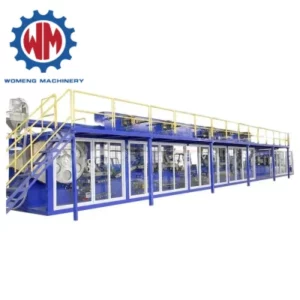Corporate social responsibility (CSR) plays a significant role in the operations of a baby diaper manufacturing machine in several key areas:
- Ethical Sourcing: CSR initiatives ensure that raw materials used in the production process are sourced ethically and sustainably. This includes promoting fair labor practices, environmentally responsible sourcing, and compliance with relevant regulations and standards.
- Environmental Sustainability: Diaper manufacturing machines can implement CSR practices aimed at reducing environmental impact. This may involve initiatives such as energy efficiency improvements, waste reduction, recycling programs, and the use of eco-friendly materials in diaper production.
- Product Safety and Quality: CSR programs prioritize product safety and quality to ensure that diapers manufactured by the machine meet rigorous standards and regulations. This includes implementing quality control measures, adhering to safety guidelines, and conducting regular testing and inspection processes.
- Community Engagement: CSR efforts involve engaging with local communities to address social needs and contribute to community development initiatives. This may include supporting education programs, healthcare services, infrastructure projects, and economic empowerment opportunities for community members.
- Employee Welfare: Diaper manufacturing machines uphold CSR principles by prioritizing the welfare and well-being of their employees. This includes providing safe working conditions, fair wages, benefits, training programs, and opportunities for professional development and advancement.
- Transparency and Accountability: CSR initiatives promote transparency and accountability in business operations by disclosing information about the company’s social, environmental, and ethical performance. This fosters trust and credibility with stakeholders, including customers, baby diaper manufacturing machine investors, employees, and the broader community.
- Stakeholder Engagement: Diaper manufacturing machines engage with stakeholders, including customers, suppliers, government agencies, NGOs, and industry partners, to identify social and environmental priorities, address concerns, and collaborate on sustainable solutions.
- Philanthropy and Volunteerism: CSR programs may involve philanthropic initiatives and volunteer activities that support charitable causes and community organizations. This could include donating diapers to families in need, sponsoring community events, or organizing employee volunteer days.
- Supply Chain Responsibility: Diaper manufacturing machines take responsibility for the social and environmental impacts associated with their supply chain activities. This includes promoting ethical sourcing practices, monitoring suppliers’ adherence to CSR standards, and addressing any issues or violations that arise.
Overall, corporate social responsibility is integral to the operations of a baby diaper manufacturing machine, guiding decisions and actions that prioritize ethical, social, and environmental considerations. By integrating CSR principles into their business practices, diaper manufacturing machines can contribute to sustainable development, positive social impact, and long-term success.


Leave a Reply